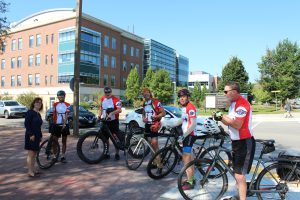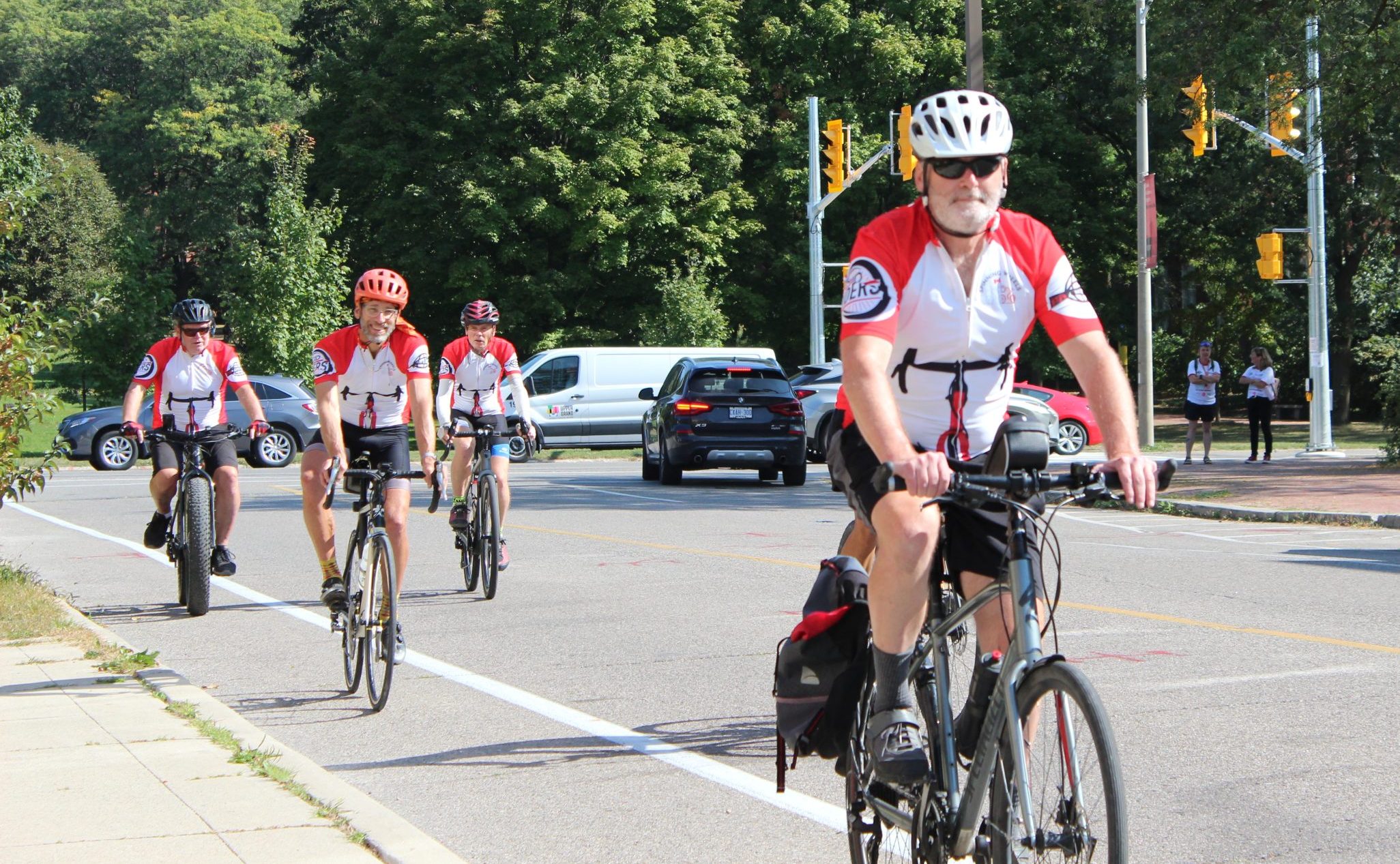GUELPH – Spinning Wheels, a Parkinson’s awareness cycling group, made a pit stop at the University of Guelph to meet with cardiovascular physiology researcher Dr. Philip Millar and his research team on Sept. 19.
Millar has been studying the effects of exercise on individuals experiencing symptoms of Parkinson’s disease and explores how exercise can mitigate symptoms and improve a patient’s quality of life.
“Our focus is to try to understand if one form of exercise might be better for someone who’s living with Parkinson’s than another form,” said Millar.
“People with Parkinson’s are recommended to exercise, but we want to try to figure out how to maximize those benefits.”
According to the Parkinson’s Foundation, the disease is neurodegenerative and mainly affects the central nervous system, ultimately affecting both motor and non-motor systems in the body.
Symptoms of Parkinson’s disease, which typically emerge slowly, include tremors, rigidity, slowness of movement and difficulty with balance. Other more neuropsychiatric problem may also develop as the disease progresses.

Spinning Wheels members pose for a photo. From left: Li Jiang, Mike Loghrin, Steven Iseman, Lloyd Taylor and Michael Snetsinger. Photo by Ellouise Thompson
Spinning Wheels began in 2022 with Steven Iseman and Jim Redmond, who have both been diagnosed with Parkinson’s, embarking on a three-month cycling journey, raising $120,000 for Parkinson’s charities.
This year Iseman and Redmond are joined by a group of five other cyclists, all of whom have been diagnosed with Parkinson’s.
The group is set to travel over 10,000km this year, making its way through all 10 provinces as well as the Yukon and NWT.
Iseman was diagnosed in 2013 at the age of 48, just six months after his father was diagnosed as well.
“I was familiar with his symptoms, so I, in some sense, I kind of was expecting it, but it still felt like an elephant had just landed on my head,” said Iseman.
Now 59m he says he’s always been a cyclist, and while Parkinson’s has tried to keep him out of the saddle, he refused to give up.
“I’ve always been a cyclist, Iseman told the Advertiser.
“I started taking it seriously after Parkinson’s. I used to treat it lightly, go on a ride and sort of be leisurely about it. I don’t do that anymore.
“There was a time when I lost the ability to cycle because of the Parkinson’s, and I got it back thanks to help from my neurologist, with drugs and with some therapy, and any time I’m in the saddle now I think about how lucky I am, and it really feels that way.”

Steven Iseman smiles as the Spinning Wheels group arrives at the University of Guelph. Photo by Ellouise Thompson
Millar’s study, published on Sept. 1, included 29 people diagnosed with Parkinson’s who were split into two random groups. Group one was subjected to moderate intensity cycling, while the other group participated in high intensity, short interval cycling.
“We saw that both groups improved their cardiorespiratory fitness,” said Millar.
“We saw a trend that the high intensity interval training had a little bit of a higher response, so they had a little bit of a greater benefit of doing the training, but in terms of the motor symptoms, so the Parkinson symptoms, they were similar between the two groups.”
He added, “So we take that as encouraging, because it really means then you can choose the type of exercise that perhaps you enjoy the most, that fits your schedule, and you won’t be losing out on any benefits.”
Iseman says cycling has helped him alleviate a great deal of his motor symptoms, just as it has for so many people in the Parkinson’s community.
The only thing left now, he says, is for science to catch up.
“It is a transformation. I am really waiting for the science to catch up with what I see already,” said Iseman.
“You know, when I’m off a bike, I feel myself squirming around and, you know, I feel a little bit symptomatic. The relief goes away … when I’m sitting in this saddle; it feels immediately fantastic.”
The Spinning Wheels team will finish its journey at Parliament Hill on Sept. 28.
Anyone interested in donating to the fundraiser can visit gofundme.com/f/spinning-wheels-relay-to-end-parkinsons.




